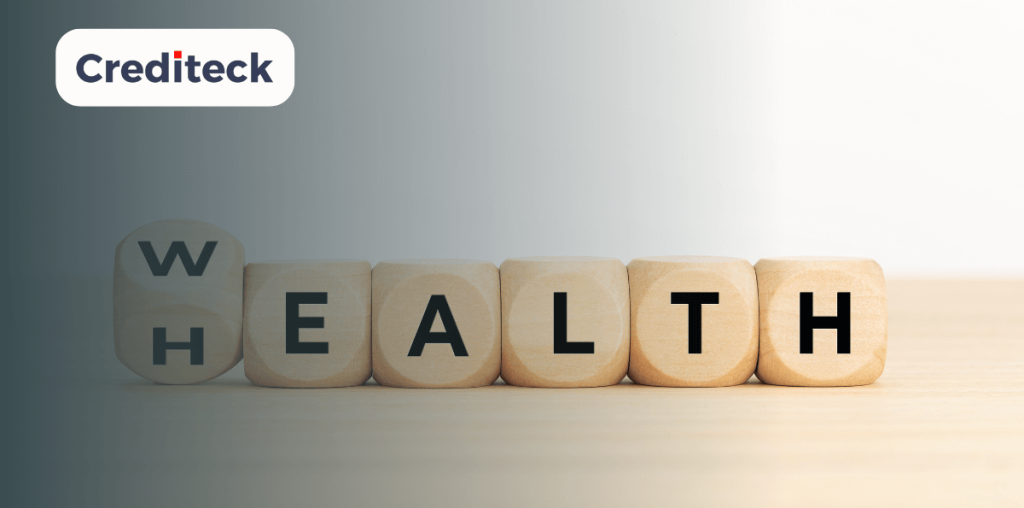Overview
Most people are familiar with the saying, “Health is wealth.” However, there may be more truth to it than meets the eye. Is there, in fact, a link between your health behaviours and your financial wellbeing?
Well, it turns out there is. Several studies have found a positive correlation between constructive health behaviours and financial wellbeing. The relationship may be bidirectional. That is, doing well in one area allows one to do better in the other. Regular exercise and a healthy diet can lead to lower healthcare expenditures, higher productivity at work, better stress management, and the ability to improve your focus and stamina, which may lead to better financial decision-making.
Therefore, it’s important to start taking control of your finances by taking control of your health behaviours. Let’s review five essential healthy habits that can boost your performance in other domains.
Habit #1: Consistent Exercise
Sometimes, a healthier financial life begins in the gym – or even in the comfort of your own home. You don’t have to become a bodybuilder or a marathon runner to benefit from exercise – engaging in simple bodyweight exercises such as push-ups and sit-ups for 15 minutes per day may suffice to boost your physical and emotional wellbeing. Alternatively, walking outside for 30 minutes per day may not only help with weight management but also improve your heart health and mood.
Start small and build from there. Pick an exercise routine you can stick with and gradually increase the complexity and variety of your exercises. Adding this to your routine may help strengthen your focus, mindset, and physical and psychological wellbeing, which, in turn, may lead to better financial decision-making. One study links engaging in exercise and increasing one’s personal income. In the long run, regular exercise may very well result in a better financial outcome.
While consistent exercise may help indirectly, we understand that it will not pay the bills. If you need to cover urgent expenses, apply for a personal loan via Crediteck. We don’t check credit during the online application process.
Habit #2: A Healthy Diet
An equally important aspect of a healthy lifestyle is having a reasonable diet. When you overindulge in sweets and processed foods, you generally experience a lower mood and a lower quality of life, which may, in turn, negatively impact your financial decisions. Drinking more water, cutting down on sugary and salty snacks, and eating mostly unprocessed, whole foods such as white meat, fruits, and vegetables, may lead to a better mood and improved physical and mental health, which may, in turn, assist you in making wiser financial choices. This study links eating healthily with a positive impact on your bank account.
Habit #3: Intermittent Fasting
While it can be difficult to stick to healthy habits like intermittent fasting, the dividends make it worth your while. Intermittent fasting has been proven to be an effective weight management tool as well as having a positive effect on blood glucose, insulin sensitivity, and energy levels. The most popular intermittent fasting method is the 16/8 method, whereby you fast for 16 hours and have an 8-hour eating window. Many people prefer to eat from 12-8 P.M., but you can also shift it around, for example, if you prefer to have breakfast in the morning. Learning to manage the timing of when you eat may translate into better financial choices long-term. While there’s no study directly linking intermittent fasting with better finances, it is reasonable to assume that a healthy lifestyle that incorporates intermittent fasting is more likely to result in better financial choices.
Habit #4: Avoid Smoking and Excessive Alcohol Consumption
The negative health effects of smoking cigarettes and consuming alcohol aside, these are expensive habits. A pack of cigarettes can cost between $13-15, depending on the province. A typical smoker may consume one pack of cigarettes every 1-2 days, which can translate into hundreds of dollars per month. A 12-pack of beer may cost $13.50, which can translate to hundreds of dollars per year spent on beer. Therefore, avoiding cigarettes and alcohol completely can result in thousands of dollars’ worth of savings in the long term. This, of course, may have a significant positive effect on your financial wellbeing. While this is a direct impact on your finances, there are also indirect impacts via reduced healthcare costs due to a better health status and improved decision-making due to higher wellbeing.
Habit #5: Get a Good Night’s Sleep
A consistent sleep schedule is one of the biggest indicators of a healthy lifestyle. If you go to bed early and wake up rested, you may be more productive at work and have more energy and focus, which may translate to making better financial decisions and even higher earnings. Over the long term, the positive choices you make helped by higher sleep quality may have a significant positive effect on your overall financial outcome. This study links better-quality sleep with the ability to earn a higher income.
The Bottom Line
In sum, adhering to healthy habits may indirectly – and sometimes directly – lead to better financial behaviours. Of course, simply following a healthy lifestyle is not going magically to solve anyone’s financial problems. However, it may encourage a mindset that focuses on solutions rather than obstacles as well as improving physical and psychological wellbeing. This may, in turn, help one make better financial choices. Over the long term, these small positive choices may result in a better overall outcome.
Financial wellbeing is a journey, not a destination. If you need to cover urgent expenses in the short term, simply apply for a personal loan online via Crediteck. We don’t check credit scores or credit reports during the simple and quick online application process.


